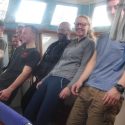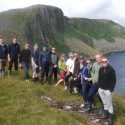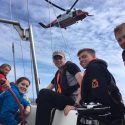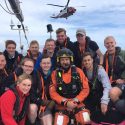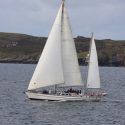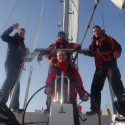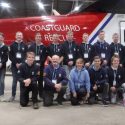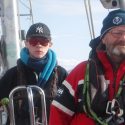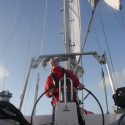Headquarters RAF Air Cadets West Coast Challenge Offshore Sailing Expedition 2019
The Headquarters RAF Air Cadets West Coast Challenge offshore sailing expedition assembled in the port of Oban on Friday the 9th of August under leaden skies and with the threat of a Force 9 storm to come. The ten-day voyage for this group of over 18 year-old cadets from across the UK was already looking like a serious challenge for the crew of novice sailors.
As with any sailing expedition of this nature the voyage would be dictated to by the wind, the weather and the sea conditions but the overall objective was to make for Stornoway on the Isle of Lewis to meet with the local RAF Air Cadet Squadron and to carry out sample gathering for a micro-plastics research project being conducted by Herriot Watt University. But the question was would the severe conditions threaten the outcome?
After a full safety brief and issue of waterproofs, harnesses and lifejackets the cadet crew sat around the table in the saloon of the 72’ yacht Alba Venturer together with the sea-staff from the boat’s operators, Ocean Youth Trust Scotland, to discuss the possibilities and to agree a plan.
It was going to be a long and challenging introduction to offshore sailing but, dismissing the gentler options, the crew elected to go for it and set off for Stornoway that evening with a sense of excitement and slight trepidation!
Quickly falling into the watch system of four hours on, four hours off, and dealing with the effects of sea-sickness together with very little sleep, the cadet sailors worked hard to overcome the challenges that they faced.
Eventually, after sailing non-stop for 24 hours, they arrived into the sanctuary of the Shiant Isles where they dropped anchor and climbed into their bunks. The following day, after exploring the remote and uninhabited island and refreshed from their marathon inauguration, the now proficient team set sail for Stornoway, a relatively short distance to the north.
Alba Venturer arrived into Stornoway on the Monday evening and tied-up alomgside the RNLI Lifeboat in the marina where they had their first meal together around the table and without bouncing and rolling around through the waves and relentless seas.
The following morning a visit was arranged to the Lifeboat; a great opportunity to appreciate the skills and bravery of the lifeboat crew and to learn of the resources available to those at sea.
Later that day the cadets and sea-staff took advantage of an invitation to visit the Coastguard rescue helicopter base at Stornoway airport, organised by the local ATC Squadron Commander who just happens to be a Coastguard helicopter engineer! The tour included a detailed briefing in the operations room, made all the more compelling by the direct relevance to the cadet’s voyage so far and the journey yet to come, together with the chance to clamber in and around a helicopter under the guidance of the duty crew.
The day was rounded-off by showing members of the local Squadron around Alba Venturer; a chance to inspire future Air Cadet sailors and to establish links with cadets from across the UK.
After such a varied and interesting day Alba Venturer’s crew quickly slipped back in to the now familiar routine of sailing the vessel out of Stornoway to begin the journey back to Oban. However, not long after leaving the harbour the air was filled with the sound of pounding rotor blades. The Coastguard helicopter was here to practice by landing the winchman amongst the sails and rigging onto the stern of the boat!
All went well with the practice drill; a precision performance by the professional airmen aided by the discipline and sailing skills displayed by the Alba Venturer team. As the winchman was lifted from the deck the noise and commotion began to ease and, with the crewman safely back inside the aircraft’s cabin (clutching bacon rolls prepared in Venturer’s galley!), the helicopter headed off ready for their next call-out whenever and wherever that might be.
With relative calm restored the crew steered the vessel homeward beating a hard course into the wind aiming for Oban calling at Portree, the Isle of Oronsay and Tobermory on the way. The elements were relentless and it continued to be a serious challenge throughout the remainder of the voyage. But, despite the conditions, the cadet crew still managed to take responsibility for the roles they had learned and, under light supervision, they completed the voyage with smiles and ruddy faces, new friends and new experiences, all having gained their Royal Yachting Association Competent Crew qualification along the way!
Adventure training is at the core of what we, as RAF Air Cadets, do. Personal development, leadership skills, teamwork, confidence and trust are just some of the benefits that are are widely accepted outcomes. But offshore sail training might, to some, seem to be at the edge of the Air Cadet profile; more suited, perhaps, to our nautically spirited Sea Cadet cousins. But it is precisely this contrast to mainstream Air Cadet activities that makes it so relevant and worthwhile. As the expedition organiser explains:
“Our annual offshore sailing expedition is aimed at our most senior cadets, those aged 18 years and over, as an opportunity to enjoy a serious challenge in the company of their peers without the responsibilities of supervising and managing younger cadets (which is predominantly their role). As long-standing members of the RAF Air Cadet organisation they will already hold a number of achievements and qualifications. Some will be glider pilots, others will have completed a flying scholarship or a Junior Leader course and they might hold a mountain bike instructor, mountain leader or paddlesport qualification. Probably, however, they will have little or no experience of offshore sailing and this is one of the main reasons for inviting them to spend a week onboard an OYT Scotland yacht.
As absolute novices, and amongst their peers, the hierarchy of our rank and classification structure is left behind. Each individual is allowed to develop at their own pace and to shine in the areas suited to their own attributes, whether it be as navigators, helmsmen, sail-trimmers, cooks or watch leaders. Importantly they do so under the guidance of the highly experienced and qualified OYT Scotland Sea Staff. And here is a vitally important point, the sea-staff ooze competence, knowledge and experience and could, if they wanted, humiliate, demean and demoralise the trainee crew. But they don’t. Instead they coax and encourage with patience and good humour, empowering and developing each individual, exploiting their potential and, in a very short space of time, increasing competence, confidence and skills in this, until now, alien environment.
My hope is that, as leaders and influencers within our organisation (and elsewhere in their professional and social lives) they will recognise themselves in the wide-eyed newcomer stepping over the Squadron threshold for the first time. I hope that they will reflect on their time with OYT Scotland and set about releasing potential; empowering and developing the fledgling air cadet to become a valued, trusted and successful member of the team.
After the 14th annual RAF Air Cadet offshore sailing expedition I can confidently say that, anecdotal as it might be, the evidence is there to show that it works.”
The cadets and staff have a huge appreciation for the value of their experience and are incredibly grateful to all those who helped to make the venture possible. In particular they would like to thank the Ulysses Trust for their generous support and for continuing to encourage adventurous challenges, the RAF Charitable Trust, the Singleton Trust, HQ RAF Air Cadets and, of course, OYT Scotland and a special mention for their volunteer sea-staff.
Report complied by Sqn Ldr Mike Blakey, MBE, RAFAC.
September 2019.
Photograph Credits: OYT Scotland except ‘Sailing out of Stornoway’ (Mike Blakey).
The Ulysses Trust also wish to thank the generosity of the Royal Air Force Charitable Trust for supporting this expedition. www.rafct.com

